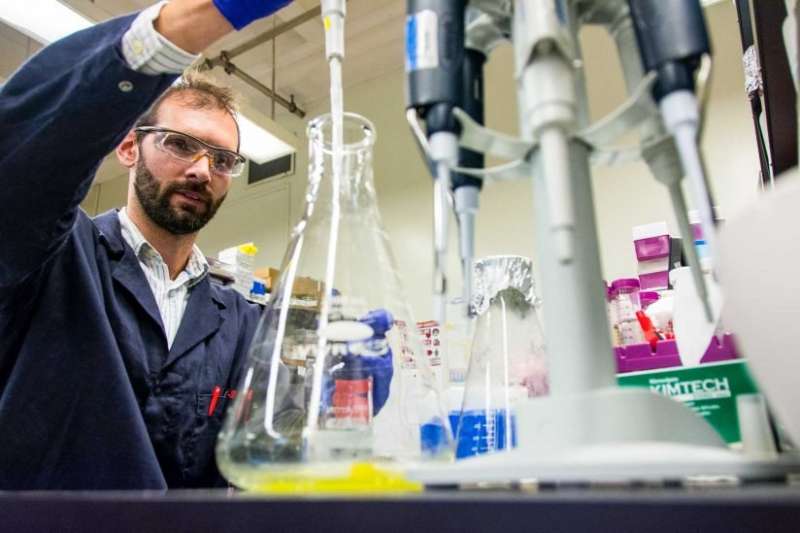Making mock meat poses questions of health, ethics and sustainability for a former butcher

Creating a lab-grown burger that sizzles, smells and even bleeds like real meat might sound like sci-fi fantasy, but for one USC student, it's a promising career path.
Johannes "Jan" van Dijk, a doctoral student at the USC School of Pharmacy, plans to use his knowledge of genetics and biochemical engineering, coupled with his experiences as a butcher, to develop new and healthier meat alternatives.
"I love the multifaceted effect on society," he said. "It's about sustainability, health, efficiency, ethics—all of those things in one project."
The average American consumes nearly 200 pounds of meat from chickens, cows, pigs and sheep each year, according to the Organisation for Economic Co-operation and Development, which projects that figure to grow to more than 207 pounds by 2024 as part of a global shift toward increased meat consumption.
That trend is concerning to van Dijk. Although he still enjoys a good steak or slice of bacon, he acknowledges the environmental effects of raising livestock such as methane emissions that contribute to global warming; increased risk of heart disease and obesity related to eating too much meat; and ethical quandaries presented by slaughtering animals for food.
"I have a really good appreciation for meat, but consciously, I can see that it's not the best thing," he said. "I still want to be able to enjoy it, but without the ethical and environmental and health issues."
Future food
Lab-grown meat has become a hot topic in recent years. One company is already adding a protein from fungi to its plant-based patty to make it pinkish when raw and to give it a slightly metallic and meaty taste when cooked. Some scientists are making artificial egg whites with components derived from fungi or yeast. Others are growing animal muscle from stem cells to create slaughter-free meat.
Van Dijk hopes to join the race to build a convincing faux burger after he graduates from USC next spring. He traces his interest in manufacturing mock meat to his part-time job as a butcher in the Netherlands, a position he took as an undergrad to make ends meet. He later worked for half a year as a full-time butcher in Brisbane, Australia, chopping and packing lamb, beef, chicken and pork for a wholesale operation.
Although eating genetically modified food might be a scary prospect for many people, van Dijk insists that the process is often misunderstood and misconstrued.
He sees genetic engineering as an essential approach to solving food shortages and ensuring environmental sustainability. It's also the main component of van Dijk's current research, which involves genetically altering fungi in hopes of discovering new drugs.
"Right now, I'm working on drugs for sick people," he said. "But food is for everyone, so the impact of creating healthier food would be way bigger, plus it would help people not get sick in the first place."
For now, as the lab manager of a research team led by Professor Clay Wang, he is genetically engineering enzymes that naturally exist in fungi. By tinkering with its DNA, he can force a fungus strain to mutate, potentially creating new substances that might be useful to scientists.
"What I'm trying to do is to study what the fungus is doing and then manipulate it so it does something slightly different, to make novel molecules that could become drugs in the future," van Dijk said.
Making the cut
It's similar to the process that led to the discovery of penicillin, the well-known class of fungus-based antibiotics, and lovastatin, a drug also derived from fungi that can lower cholesterol. However, van Dijk's methods are far more advanced. He uses CRISPR-Cas9 technology, a tool that allows him to precisely target sections of a fungus strain's genetic structure.
He likens the DNA sequence to an assembly line. By cutting it at a certain spot, he can determine which genes are responsible for building certain molecules. Then he can force the fungus to mutate at that specific point, either creating new compounds or boosting its production rate of existing molecules.
His work in the lab earned van Dijk the USC School of Pharmacy's most prestigious award, the Charles and Charlotte Krown Fellowship, which comes with a $5,000 stipend and a $5,000 allowance for research supplies and travel expenses. Only one doctoral student receives the honor each year, and the winner is selected after finalists present their research to a committee of faculty members.
To be eligible, applicants must have a 3.5 GPA and a first-authored paper published in a peer-reviewed journal, in addition to passing their qualifying exams. The fellowship is named in honor of Charles Krown, a major benefactor and honorary alumnus who also served as a member of the school's Board of Counselors. Krown funded the fellowship as part of a $1.1 million gift to the school in the 1980s.
As van Dijk finishes his final year as a PhD student at USC, he is making contacts in the food engineering industry and dreaming up ways to put his knowledge to good use. He already has an idea for a healthy burger that incorporates omega-3 and omega-6 acids from one of his least favorite foods.
"I want to be able to eat those healthy fats without the taste of fish," he said. "What if you could engineer a burger that has those fatty acids? That would be amazing."
Provided by University of Southern California


















